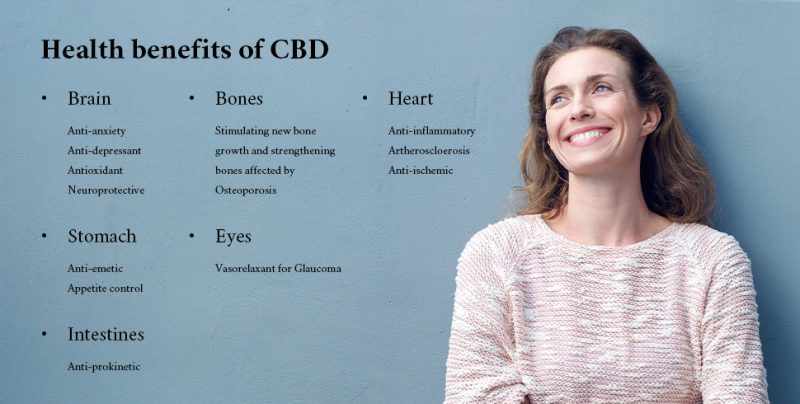
A comprehensive guide behind the facts for using CBD oil to treat the symptoms of depression, including any known side effects and a CBD dosage guide.
CBD has had a recent surge in popularity thanks to anecdotal stories in the media and it is purported to be helpful for a vast array of medical conditions. Common recurring stories that fill blog posts across the web are – “CBD has cured my depression” or “I no longer suffer anxiety since taking CBD.”These anecdotal stories paint a story about how people are using CBD oil for depression, but is there any scientific studies that quantify the claims made? What do you need to know before you consider taking CBD? The Extract has dug a little deeper.
Table of Contents
How does CBD work for depression?
CBD is part of a group of compounds called cannabinoids. The body produces its own naturally occurring cannabinoids (such as anandamide) that interact with the bodies endocannabinoid system. You also have cannabinoids that are produced within the cannabis plant of which there are around 100 that have been discovered and named.
As researchers have delved deeper into their understanding of these cannabinoids, it has been discovered that they hold certain medicinal qualities. Studies have been conducted on their isolated and pure forms. One such cannabinoid that has taken the media by storm is CBD. However, there are lots of misconceptions around our current level of scientific understanding.
To truly say that “CBD helps with depression”, you must be able to quantify how much CBD to give, at what time of the day and document how this has made changes to specific individual cases as with all other clinical studies.
Science doesn’t trust the odd anecdote making waves on the internet, although this can form the basis to conduct research. Therefore, we must investigate the studies that have been performed on CBD in a clinical research setting and analyse them in relation to depression.
CBD anxiety and depression – What does the science say?
The preclinical studies surrounding CBD have shown that it may have potential uses with regards to treating generalized anxiety disorder, panic disorder, obsessive-compulsive disorder, PTSD and depression helped by CBD. The studies conducted have shown that the effectiveness of CBD in these cases seems to come from short term use in which the subjects receive high doses (>400 – 600 mg per day).
The studies suggest that CBD works most effectively when the subjects are actively in a state of mind in which they want to help themselves. Showing that CBD is more of a tool to be used in conjunction with a positive and healthy lifestyle and not an outright cure for depression. It appears to make the associated symptoms of the aforementioned conditions easier i.e. stress, which in turn creates an environment in which the user is able to deal with day-to-day life more effectively. Users who take CBD for anxiety and depression appear to have a higher drive to exercise and to be social, which has in turn been shown to help alleviate the symptoms of anxiety and depression.
Is it legal to take CBD oil for depression in the UK?
Even though it comes from cannabis, CBD doesn’t get the user ‘high’ or ‘stoned’, it is non-addictive and doesn’t have the propensity to be abused. There are very few side effects through use and much less than conventional over-the-counter medicines such as ibuprofen or paracetamol. By all standards currently measured by scientists in terms of drug safety, CBD is 100% safe to use.
What is the best CBD for depression UK?
There are a variety of CBD products nowadays to help alleviate the symptoms of depression. CBD oil and tinctures as well as CBD edibles are quite popular among many users. CBD edibles include a variety of CBD infused food and drinks such as CBD capsules, gummies, coffee, tea, and chocolate. However, CBD oil for depression has certain benefits over other forms of CBD products.
CBD oil can be consumed in the form of drops, which are placed under the tongue with a dropper. The mucous membranes in your mouth help absorb it quickly in your bloodstream. This sublingual method of ingesting CBD offers a higher bioavailability than consuming CBD edibles.
This is because CBD bypasses your liver and digestive tract and is instead quickly metabolised by your body’s enzymes. It not only speeds up the entire absorption process but also allows a greater percentage of CBD to be taken in.
However, some people might be put off by the strong, concentrated flavour of CBD oil. This is where CBD tinctures come in. They don’t present an oily mouth feeling or an off-putting taste when placed directly under the tongue. Canndid CBD tincture range is one of the best in the market.
Canndid CBD Tincture

- CBD type: Full-spectrum
- CBD potency: 250 - 1550 mg per bottle
- COA: Available
If you are thinking about buying some CBD oil in an effort to secure a good night's sleep, the Canndid tincture range could be the product for you. There are 3 different tinctures that range from 250mg to 1500mg of cannabidiol.
It also contains many other cannabinoids like CBN, CBDA, CBC, CBG and CBDV.
Moreover, these tinctures also include essential fatty acids like Omega 3 and Omega 6.
In addition, Canndid tinctures are also third-party lab tested, GMP certified and THC- free. What gives them an edge over other forms of the best CBD for depression products is their convenience and ease of use. They can be discreetly consumed anywhere, at work or home.
Can I get CBD oil on the NHS for depression?
The UK made medical cannabis products legal and obtainable through the NHS (including CBD) on November 1st, 2018. However, even though over 50% of CBD users are reportedly self-medicating CBD for anxiety or depression in the UK, you cannot get a prescription for it through the NHS. Seemingly due to the high expense of cannabis medication compared to common pharmaceutical medications.
Currently, CBD products available for prescription in the UK are only available for sufferers of two rare forms of epilepsy or multiple sclerosis (MS). Therefore, anybody who suffers from depression who wishes to consume CBD products must use an alternative source to purchase it. Remember CBD is not illegal weed or cannabis and does not have that issue some consumers had of addiction to illegal cannabis.
CBD oil dosage for depression
Because most of the clinical research studies into CBD and depression mainly focus on animal and not human; there are currently no official medical guidelines for the correct dosage of CBD oil for depression. The answer to the question, ‘How much CBD should I take for depression’ is that there isn’t a correct dosage.
The optimal dose depends on a number of factors, including height, weight, metabolism and condition you are suffering from. However, there is an agreed consensus on how to consume CBD correctly to get the most out of it.
The method involves starting small, gradually increasing the dosage and recording your findings in a diary. Starting with a dosage of 5mg in the first couple of days and gradually increasing in increments until the desired effects have been seen.
Most anecdotal stories found that 20 mg per day is enough to notice symptom relief using CBD for depression. Also, additional columns should be added to the end of the table to advise of symptoms relieved or side effect noticed to see if there is any consistency in the data.
How Does CBD Affect The Body?
Scientists have discovered that the bodies of humans, as well as almost all vertebrate animal life from mammals to birds and fish, contain complex Freksystems in which cannabinoids can interact. Humans contain these receptors in the brain, nervous system, organs, tissues and on the surface of our skin.

This endocannabinoid system is known for the regulation of memory, pain, appetite, reward, addiction amongst a variety of different mechanisms. Each individual cannabinoid affects the endocannabinoid system in different ways, resulting in different physical and physiological effects. There is ongoing research into CBD and what these effects are in conjunction with many different disorders.
Are There Any Side Effects?
CBD oil has been declared completely safe for daily use by the World Health Organisation (WHO). Clinical research studies have been conducted which show that only a small number of people who use CBD will suffer any side effects from regular use.
In the small number of people who do observe side effects when using CBD for depression, most report that the benefits outweigh the negatives and they will continue to use it.
The most common side effects observed are: –
- Diarrhoea
- Change in appetite
- Nausea and sickness
- Tiredness and fatigue
The metabolization of certain types of pharmaceutical medication by the liver may be affected by CBD. Therefore, it is especially important that if you receive a prescription from your GP that you speak to them prior to taking CBD for depression.
Key Takeaways
At this stage in the clinical studies, CBD is looking very positive for treating depression, anxiety and other associated conditions to promote better mental health. However, it appears to be most effective when used in conjunction with a healthy lifestyle. So, CBD should be considered as an aid along with a positive lifestyle as opposed to a cure-all substance.




